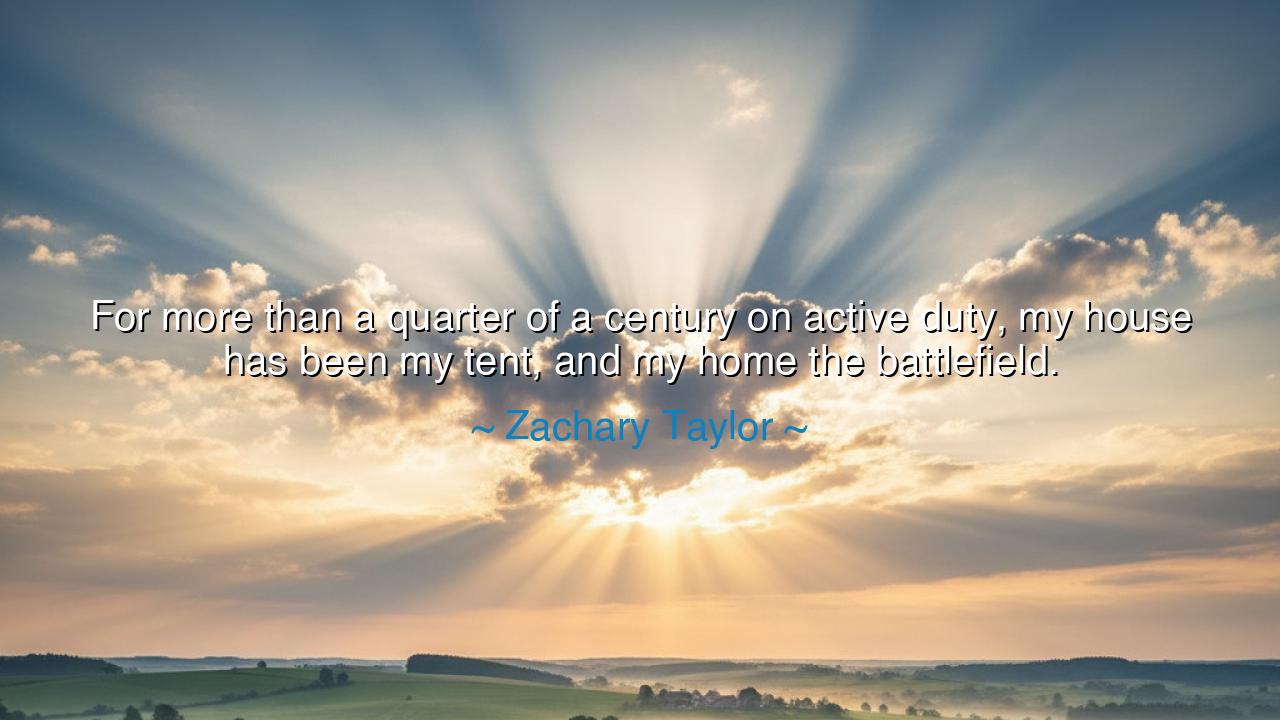
For more than a quarter of a century on active duty, my house has
For more than a quarter of a century on active duty, my house has been my tent, and my home the battlefield.






“For more than a quarter of a century on active duty, my house has been my tent, and my home the battlefield.” Thus spoke Zachary Taylor, a soldier of the early American republic, whose life was given not to comfort, but to duty. His words are not boastful, but solemn — the voice of one who has lived long in the service of something greater than himself. Within this sentence lies a truth that has echoed through every age of human struggle: that sacrifice, when freely given, transforms the ordinary life into something eternal. The tent, fragile and fleeting, becomes a temple; the battlefield, with all its terror and dust, becomes home.
In these words, Taylor captures the soul of the warrior — not the lover of battle, but the bearer of its burden. For more than twenty-five years, he dwelt not in marble halls or peaceful gardens, but beneath the open sky, where rain, wind, and death were his companions. The tent, that most humble of dwellings, came to symbolize the transience of his existence. It was not walls that made his home, but purpose. In calling the battlefield his home, he reveals that the heart adapts to wherever its duty leads it. Such is the paradox of those who serve: the places most feared by others become familiar, even beloved, when they are the price of protecting others.
The ancients understood this kind of devotion. The Roman centurion, who spent decades marching across continents, knew the same fatigue, the same longing, the same pride. His “tent” was his world, and his comrades his family. The philosopher Marcus Aurelius, himself a soldier-emperor, wrote that a man must accept the nature of his post in life as a soldier accepts his orders: without complaint, but with conviction. To live thus — to make of one’s hardships a kind of home — is to rise above mere survival and to live in harmony with duty. Taylor, though separated by centuries, speaks with this same stoic spirit. His house may have been a tent, but his foundation was iron.
There is also in his words a profound loneliness — the quiet ache of one who has lived far from hearth and family. “My home the battlefield,” he says, and we can hear both pride and sorrow intertwined. To serve one’s country or one’s calling often means to surrender personal comfort, to live apart from those we love so that others may live in peace. The battlefield becomes both a burden and a destiny — the ground upon which the soul is tested. Yet Taylor’s endurance transforms this exile into belonging. He does not lament his fate; he embraces it. To him, the life of hardship is not a tragedy, but a calling accepted with dignity.
We may also hear in his words a reflection of the timeless truth that home is not a place, but a state of being. To the one who serves, home is wherever purpose dwells. For Taylor, that purpose was the defense of his nation; for others, it may be the pursuit of truth, justice, or compassion. The tent and the battlefield stand as symbols of all human labor that demands perseverance — the artist’s studio, the surgeon’s ward, the activist’s march, the teacher’s classroom. Each is its own battlefield, and each, when filled with dedication, becomes a kind of sacred ground.
Consider, for instance, the life of Florence Nightingale, who, during the Crimean War, made the field hospitals her home. Amid the filth and suffering of war, she found purpose so profound that she transformed the very meaning of service. Like Taylor, her dwelling was not of brick or stone, but of will and compassion. Both understood that honor is not found in comfort, but in steadfastness — in remaining true to one’s mission even when the world is harsh and unyielding.
Thus, the lesson of Zachary Taylor’s words is not limited to soldiers, but to all who labor under the banner of duty. Wherever your purpose takes you, let that place become your home. Do not measure your life by ease or luxury, but by faithfulness to your path. Let the tent remind you that life is transient, and the battlefield remind you that struggle gives it meaning. Seek neither comfort nor glory, but integrity — the peace of one who knows they have done their part, even when no one watches.
So, my listener, remember this ancient truth carried through Taylor’s voice: home is not where we rest, but where we serve. Whether your battlefield is of arms or of spirit, whether your tent is a soldier’s shelter or a humble place of toil, dwell there with courage. For when your heart beats with purpose, and your hands labor for something beyond yourself, even the roughest ground becomes sacred, and even the tent becomes a home.






AAdministratorAdministrator
Welcome, honored guests. Please leave a comment, we will respond soon